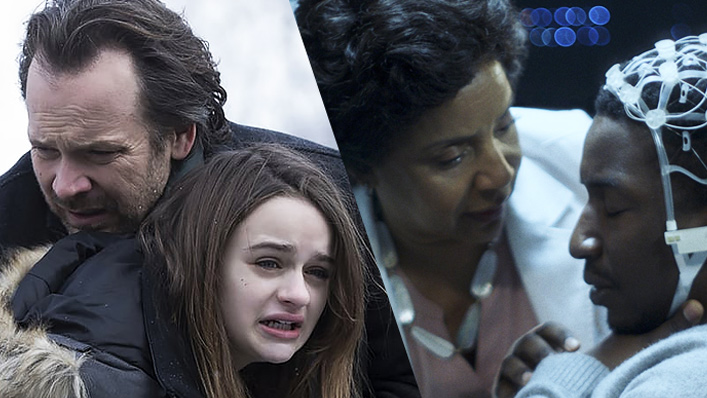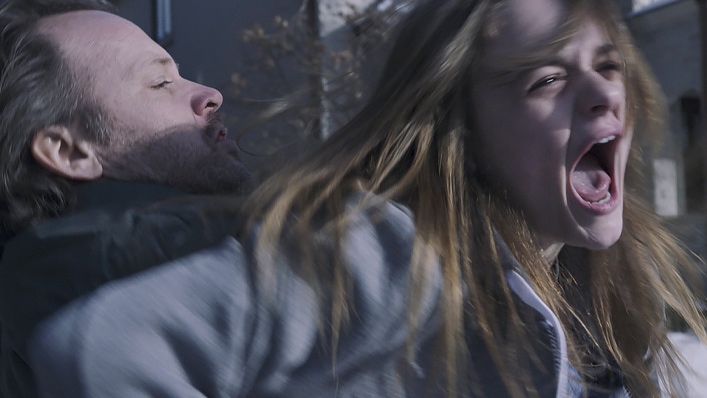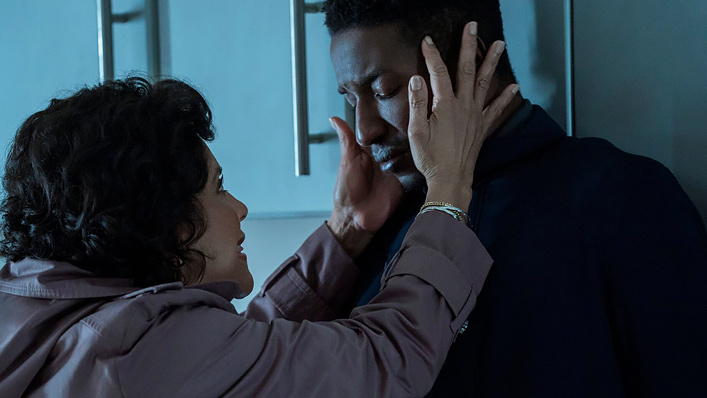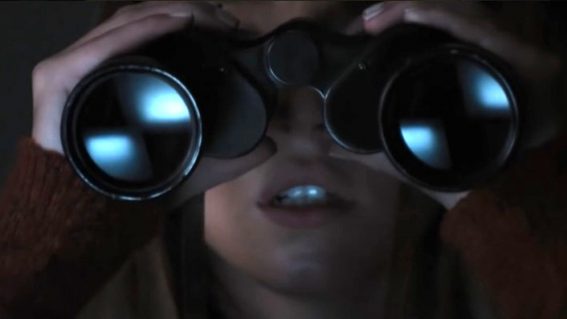The first two Welcome to the Blumhouse movies are tight and twitchy thrillers

This week the first two (of four) movies from the Welcome to the Blumhouse series arrived on Prime Video, produced by horror maestro Jason Blum. Here’s critic Luke Buckmaster’s take on The Lie and Black Box.
Prime Video advertised its Welcome to the Blumhouse series, helmed by hotshot producer Jason Blum, as a collection of four scary movies based “under the one roof.” A diorama-like poster literalised this house, implying that each narrative existed within the same spatial context: that storeys tell stories.
See also
* Best new movies and TV series on Prime Video
* All new streaming movies & series
The first unpleasant surprise in the first two Blumhouse productions—The Lie and Black Box—was that, shock horror, advertising tells lies. These films aren’t based under the same roof at all.
They are similar in some respects, though, clocking in at approximately 95 minutes a-piece and incorporating curly twists—the kind sometimes referred to as a Tomato Surprise. They both explore distressed parents in morally complex situations, and even, more specifically, both begin with home video footage of family moments during a child’s formative years.
They are both lean, thoroughly decent thrillers; here’s my take on each of them.

The Lie
This is one of those ‘what would you do?’ thrillers in which a big fib leads to many smaller ones, triggering a distressing chain of events engulfing characters who soon think “man, I probably should’ve just told the truth.” The Macguffin is a traumatic event that nobody (including the audience) observes other than Kayla (Joey King), an anguished, vinegary 15-year-old with a bad attitude (even for a teenager) and what appears to be desire to get caught.
A guilt-wracked Kayla admits that, while alone on a tall bridge in the woods situated high above icy rapids, she pushed her frenemy Brittany (Devery Jacobs) off it—presumably resulting in her death. To tell the police, or not tell the police? Kayla’s lawyer mother Rebecca (Mireille Enos) believes the incident constitutes second degree murder, and her musician father Jay (Peter Sarsgaard) and is adament they were completely alone in the woods—no witnesses.
The characters of course decide not to inform authorities (what kind of thriller requires people to behave honourably?), inevitably meaning—when the girl’s dad and the police come a-knocking—that they must fess up or construct an alternate version of events that might leave them exposed.
This simple story setup is conceptually, structurally and to a degree morally reminiscent of Sam Raimi’s small town thriller A Simple Plan, but triggered by the idea of protecting family rather than taking home a great big bag of cash. The characters begin with moral reasoning—this course of action might be best for you, for her, for the family, etcetera—then tumble down a rabbithole and act less rational as their stress levels climb. Writer/director Veena Sud (remaking a 2015 German film) does a fine job building and escalating tension; there is a sense throughout that the director is tightening the screws, reducing the amount of oxygen in the room.
Often these kinds of films, which involve the viewer imagining how they might respond themselves, appear logical at the time but fall apart plausibility-wise in retrospect. There are numerous terms to describe this—including “fridge logic” and “jellybean moment”. But The Lie remains mostly on the right side of plausible, notwithstanding the characters’ ability to act more, let’s say…dramatically than perhaps most of us would, and a twist or two that will test some audiences.
It’s certainly helped by the tone, which is tetchy and noirish, and the performances. Mireille Enos and Peter Sarsgaard infect the audience with anguish and intensity, struggling to understand a daughter (very well, and quite irritably played by Joey King) who seems perfectly fine with ruining her own life. There are times when the film feels single note-ish, but Sud offsets that same-sameness with a creeping dread. Despite regular changes in location, The Lie regularly feels like a chamber piece.

Black Box
Director Emmanuel Osei-Kuffour’s sci-fi thriller takes the theme of missing and distorted memories and gives it an actual, navigable space. The amnesia-afflicted protagonist, Nolan (Mamoudou Athie), visits a dark and dreamscape-like astral plane, reminiscent of the terrible passageways of the damned depicted in the Insidious movies, which he experiences as part of an experimental therapy.
Osei-Kuffour presents an interesting modern spin on hypnotism: gone are the swinging pocket watches, replaced by a mouse cursor moving from side to side in a virtual environment accessible by wearing what looks like a very chunky and clunky VR headset. Nolan—a photographer—is doing this because he has amnesia, induced after a car accident in which his wife died.
Early in the piece one of his publishers informs him that his work isn’t up to snuff, softening the blow with some talk about the grim realities of the publishing industry. This is less a comment on lapsed professionalism than a reminder of his deteriorating mindset, which, importantly, provides problems in his parenting of a cute and tolerant young daughter (Amanda Christine). All this pushes Nolan in the direction the plot always needed him to go—into the arms of ambitious neurologist Lillian (Phylicia Rashad) and her experimental procedure.
“Your subconscious is active,” she tells him, which sounds encouraging—before said subconscious materialises in the form of a freaky malformed human-like creature that creeps around like an arachnid. This thing shocks Nolan while he relives the kind of memories in which freaky malformed human-like creatures are certainly not welcome—such as his wedding day. I like this setup, mixing the ancient mystery of dreams with modern tech fantasies and plonking it all into the brian of a psychologically troubled character, cursed to confront the dual horror of mind and body displacement.
Mamoudou Athie’s punch-packing performance realistically juggles conflicting thoughts and insecurities even when the script gets far-out, his face squeezing into the appropriate contortions of terror as real and nightmarish worlds merge. This creates for his character—to say the least—a crisis of the self. A big twist (no spoilers) hits the reset button in some respects, ushering in a final act that is more character-oriented than the hellish brouhaha initially signposted.
While The Lie is noirish, Black Box is more like an episode of Black Mirror. If you’re staying in for the night and intend to watch both, the order should probably be: stress-inducing drama first (The Lie) followed by the zanier sci-fi, as both the time and the movie get closer to midnight.



















